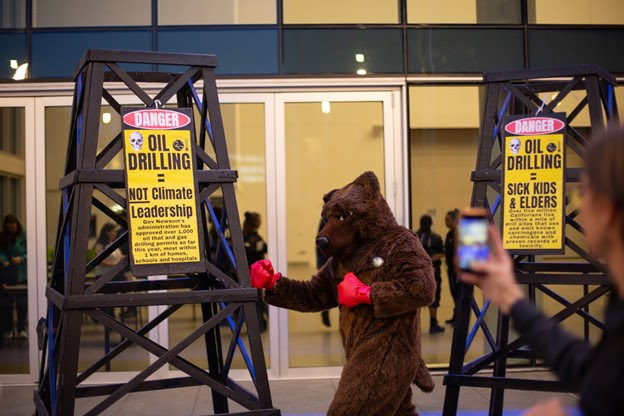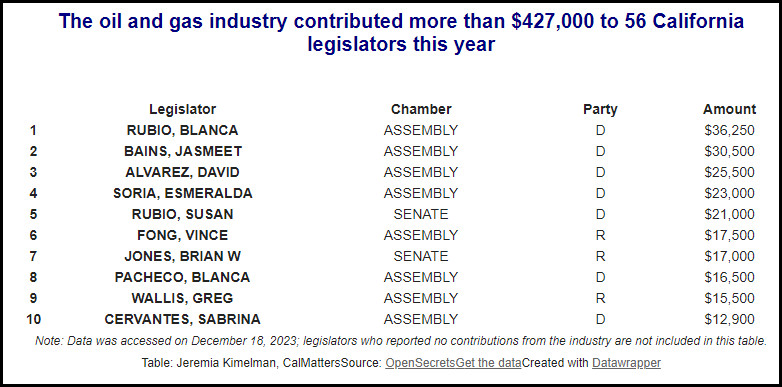California Federation of Republican Women
Officially Chartered by the National Federation of Republican Women
and the California Republican Party
From the Desk of Mary Ervin, CFRW President
Submitted by Jeanne Solnordal, CFRW Legislative Analyst
December 20, 2023
FEEL FREE TO SHARE THIS INFORMATION WITH YOUR CLUB MEMBERS,
IN YOUR NEWSLETTERS AND ON YOUR WEBSITES
How the Oil Industry Prevails in CA Legislature


CalMatters Digital Democracy reporter Ryan Sabalo and data journalist Jeremia Kimelman vie into the curious alliance between oil companies and the powerful State Building and Construction Trades Council.
IN SUMMARY
Two-thirds of the bills opposed by the oil industry this year were killed, thanks in part to an alliance with the building trades union, forcing Democrats to sometimes choose between jobs and the environment.
The dirty little secret about green California, a global leader on climate policies, is that Big Oil still wins a lot of its political fights.
“In California, our best (environmental) bills are being blocked by the oil industry using the building trades as ventriloquist dummies,” said RL Miller, a Democratic activist and environmental advocate at Climate Hawks Vote.
Of at least 21 bills the oil and gas industry opposed this year, Gov. Gavin Newsom signed only seven. Half of the bills the oil industry opposed also faced opposition from the building trades union, according to interviews and a CalMatters analysis of legislative testimony and written opposition to bills.
Among them were three measures by Sen. Lena Gonzalez that were ultimately killed: Senate Bill 252, which would have required two state pension funds to divest from fossil fuels; SB 556, which would have made oil and gas companies liable for healthcare expenses related to respiratory illnesses; and SB 674 to create a statewide standard for petroleum refinery air monitoring systems.
Then there was SB842. Originally a measure on homelessness, it later morphed into a bill that would have required the California Energy Commission’s new watchdog division on oil prices to consult with oil industry stakeholders and labor groups “to avoid any adverse impacts.” That bill was authored by Democratic Sen. Steven Bradford of Inglewood, whose campaigns received more than $680,000 from the trades unions and at least $155,000 from the oil and gas industry since 2006, according to a CalMatters analysis. Gov. Gavin Newsom ultimately vetoed the bill.

The 450,000-member union of Teamsters, boilermakers, iron workers and more has proven a key ally to Big Oil, helping to block several bills opposed by the industry this year. The council has also given big money to California’s labor-friendly Democrats, donating at least $427,000 to the campaigns of California’s legislators in 2023 and more than $3.5 million to legislative campaigns since 2019.
Many of the union concerns surrounding these bills relate to jobs. A 2020 study that was commissioned by the council found that fossil fuel jobs pay about $30,000 more per year than the solar industry, and that a 50% reduction in fossil fuel consumption could eliminate 57,000 jobs.

This year’s biggest battle
There has long been tension between California’s reputation for environmentalism and its role as the nation’s seventh-largest oil producer and the third-largest refiner of crude oil. California is also one of the top consumers of gasoline on the planet, even with a special blend of gas that requires a more expensive refining process.

That tension erupted into a war last year under the Newsom administration, which adopted policies to ban sales of new gas-powered cars by 2035 and go carbon neutral by 2045, with a goal of dropping gas consumption by 94%.
The biggest battle was fought early this year after gas prices spiked to record levels and Newsom demanded a windfall tax on oil company profits.
“Nothing justifies these outrageous and unconscionable prices,” Newsom said in October 2022 as he called a special session of the Legislature. “This is just price gouging. They can’t get away with it. They’re fleecing you. They’re taking advantage of you, every single one, every single day. Hundreds of millions of dollars a week they’re putting in their pockets.”

But the law was significantly watered down amid opposition from the trades unions and the oil industry. In the end, it called for a new watchdog division of the California Energy Commission to monitor prices and possibly apply penalties. But it could take years to develop the rules determining unfair profits.
